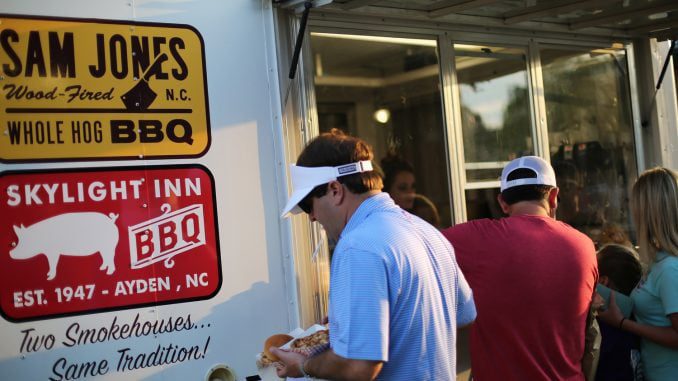
Sometimes the differences among North Carolinians prove that we have a distinctive and similar state identity.
North Carolinians, for instance, are divided passionately regarding whether eastern or western barbecue and sometimes whether clogging or shag dancing are more representative of North Carolina culture. Many times, humor, or kind-hearted teasing, is a way to express truth in a more diluted form.
As a young boy in the Piedmont, my definition of North Carolina included what is called western North Carolina barbecue and clogging.
Even before I was old enough to be given my first rifle, I was aware of the difference between eastern and western N.C. barbecue. Eastern BBQ, strangely enough, was almost considered a foreign dish. More than one elder statesman from the Piedmont informed me that the sauce was indeed different — it could be “downright bitter!” Adding ketchup to slaw, furthermore, was just what one did. It complemented the sliced or chopped pork shoulder. With my provincial yet well-informed definition of barbecue and sides, I kept chomping away, whenever there was an opportunity to do so.
Growing up in the Piedmont, I also saw cloggers at many festivals. Basic clogging proficiency was the apex of my brief career, but I knew advanced cloggers with a competitive streak. During picnics and such gatherings, it was not uncommon to see folks break out briefly into improvised clogging. Sure, people talked about beach music and shag dancing, but as a young boy, that pair still seemed for the traveling hobbyist on the occasional weekend. I was wrong, but to me, the music didn’t seem too much different than what I heard after picking up an old Jan and Dean LP and trying not to incur anyone’s wrath when I hastily placed the needle on the spinning 33.3. (For the record, this story speaks more about the impressive changing modalities of recording technology than it does concerning my age.)
Since the first decade of my life, I have learned to appreciate that North Carolina is a broader place with distinctive qualities. I like eastern and Piedmont North Carolina barbecue sauces; in fact, it’s great to prepare and serve both for friends.
For the outsider looking in, North Carolina’s barbecue and sauces are more similar than different. For one, the meat is pork (not beef or mutton), and the eastern and western sauces have only slight differentiations when compared to Memphis and Kansas City tomato, South Carolina mustard, or the Alabama mayo-based white sauce. (For more on this fascinating history, please see John Shelton Reed and Dale Volberg Reed’s informative yet entertaining “Holy Smoke.”)
Maybe “a great compromise” in North Carolina history was when shagging was made the official popular dance and clogging was declared the official folk dance in 2005. Maybe another noteworthy compromise was when the Lexington Barbecue Festival was named the official food festival of the Piedmont Triad Region instead of the state’s barbecue or food festival.
I am still partial to western N.C. barbecue because that was my introduction to the cuisine. My muscle memory can also prompt a few clogging steps rather than basic shag dancing steps. All those, however, help comprise a distinct N.C. barbecue and dance culture that I enjoy experiencing more and more.
The famous Southern writer, Zora Neale Hurston once said: “Maybe all of us who do not have the good fortune to meet or meet again, in this world, will meet at a barbecue.” Whether eastern N.C. or western N.C. barbecue, let me know when and where; I’ll be there.



